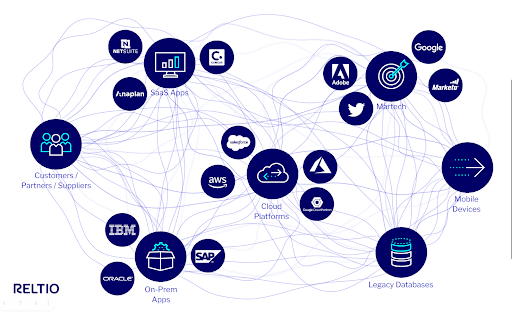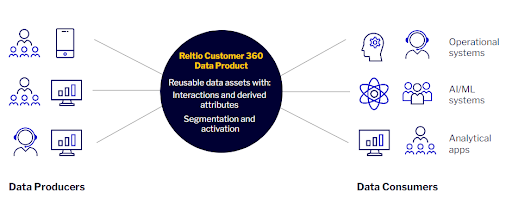How AI is fueling the growing market for cloud-based data unification

Some recent rumored mergers and acquisitions have thrust the data unification and management industry under the microscope of both media and investors. Growing demand for cloud-based data unification solutions, essential for leveraging AI and unleashing digital transformation, has raised the stakes for companies in nearly every industry.
The data unification industry is experiencing several durable secular trends that are driving recent attention. The heightened conversation around AI highlights the critical need for clean, unified data to fuel intelligent systems and drive accurate insights. As data continues to proliferate at an exponential rate, the fragmentation of data across various sources and silos is becoming increasingly problematic for organizations. Additionally, enterprises recognize the growing need for real-time data to support agile decision-making and personalized customer experiences in the digital age.
Digital transformation and AI initiatives are stalling on fragmented data
In an era when digital transformation dictates the pace of business innovation, a staggering paradox has emerged: most C-level executives have initiated digital transformation projects, but an overwhelming 95% are at risk of failure.
The crux of this dilemma? Siloed, fragmented, and disconnected data undermine efforts to leverage data as the most valuable enterprise economic asset it should be. Data can be found in over 800 business applications in the average enterprise, yet only 29% are interconnected, according to Salesforce. Inconsistent, partial, or incorrect data from even a single app can lead to small mistakes, which, over time, become significant errors.
Another silo problem lies in the recent phenomenon of data becoming trapped inside applications. Data is becoming even more siloed as businesses continue to add more cloud and specialized applications across every department, such as ERP, HR and CRM. Applications can create or consume data as an interoperable asset. Since an enterprise is never dependent on a single application, data should never be owned by a single application.
This disjointed data landscape fuels inefficiency and inaccuracies and significantly degrades data’s economic value. Organizations inadvertently nurture a culture of duplication and waste by treating data as an isolated commodity tailored for specific use cases.
Data fragmentation and silos are common challenges faced by various industries, including financial services, insurance, B2B, and retail. These issues stem from customer data being scattered across multiple systems, departments, and channels, making it difficult to gain a comprehensive view of the customer and optimize processes. Financial institutions struggle with regulatory compliance, while insurance companies face inefficiencies in underwriting and claims due to siloed data. B2B companies often have disconnected sales and marketing data and fragmented supply chain information. Online and offline retailers grapple with creating a unified view of the customer journey and delivering consistent experiences across channels.
There remains a high prevalence of data silos and fragmentation across most industries, emphasizing the need for better data integration and management practices to drive efficiency, compliance, and customer satisfaction.
Figure 1. Data silos and fragmentation are the main barriers to digital transformation

Data unification moves far beyond MDM
Cloud-based data unification and management solutions have emerged as the ray of hope in this landscape, offering a comprehensive strategy to navigate the enterprise data conundrum. By our estimate, the market for these solutions is growing 15% compounded annually with the potential to reach $50 billion by 2030.¹
This approach transforms data into trusted assets for operational and analytical use. At its core, the data unification and management industry encompasses a series of solutions and technologies, including entity resolution, cloud-based multi-domain master data management (MDM), and data products such as Customer 360, to overcome the significant problems created by data silos and fragmentation.
The pivot towards data unification and management is facilitated by cloud-based solutions that offer real-time silo breakdown through flexible APIs. These solutions, endowed with capabilities like MDM and entity resolution, are pivotal in creating a cohesive view of enterprise data. This unlocks the potential for growth and innovation and enhances risk mitigation and customer experiences. Key features in these cloud platforms include canonical data models for seamless data integration, scalability to manage burgeoning data volumes, API-first performance for real-time data availability, easy configuration for rapid adaptability, and robust security and compliance measures.
Reltio made a strategic decision to maniacally focus on being the market leader in data unification. We firmly believe that core data should be treated as an interoperable and reusable asset across the enterprise, eliminating the inefficiencies and complexities associated with fragmentation, silos, and use-case-specific data. By focusing on this critical aspect, we aim to break the cycle of reinventing the wheel whenever data is needed for a new initiative.
The importance of unified and trusted data cannot be overstated. Every digital initiative, whether a process, BI Analytics, application, or AI/ML, relies on the foundation of unified data. Our mission is to ensure that our customer’s data is fast, efficient, reliable, and, most importantly, trusted. This has been the driving force behind our efforts, enabling us to deliver the use case that Reltio has been focusing on.
As we look to the future, it is clear that unified and interoperable data will fuel the next generation of data-driven processes and applications. With the advent of AI/ML and GPT innovations, these applications are being reimagined and disrupted in ways we never thought possible. However, it is crucial to recognize that AI/ML itself requires data to operate on, underscoring the importance of data unification as the bedrock for these transformative technologies.
Solving the 360 use case with reusable data products
When we think of reusability in the data tech space, MDM is the original data product because core data entities such as customers, products, and suppliers are reused across the enterprise. MDM has enabled high-quality core data in a streamlined way. However, the demand is growing for more comprehensive, interoperable data assets to provide businesses with the efficiency and quality they need.
Data products are a new way of looking at 360 data as a reusable asset—as a product. For instance, a unified customer data foundation can elevate customer experiences, drive strategic initiatives, and foster innovation. However, achieving such a level of data interoperability requires a significant shift in both strategy and mindset. It demands moving beyond the confines of siloed data to embrace a model where data is seamlessly exchanged and utilized across different systems and applications.
Figure 2: Reusable Customer 360 profiles drive efficiency and responsiveness

How Reltio enables CarMax to deliver 360 connected customer experience
CarMax, the largest used car retailer in the U.S., faced challenges with legacy systems that siloed data, hindering its ability to provide fast and responsive customer service across a growing array of digital touchpoints. In addition to its tech challenges, new digital-native competitors such as Carvana and others emerged with an eye on disrupting them.
By implementing Reltio, CarMax significantly improved its operations and customer experience. It attributes much of its growth over the past five years to its focus on the omnichannel customer experience, which is made possible with connected data. Reltio enabled CarMax to deliver a more personalized experience to customers across all channels, ensuring that systems and associates have access to the most up-to-date data to best serve customers at any point along their car-buying journey. The solution also allows management to rely on aggregated source data for audit purposes and supports the company’s data privacy initiatives.
CarMax also expanded its 360-degree concept to vehicles, providing vehicle information specific to individual VINs and helping to price and market its vehicle inventory accurately.
Moving at the speed of business today
The recent spotlight on the data management and unification landscape comes as no surprise to me. Companies need cloud data management and technology solutions more than ever to move at the rapidly increasing speed of business today.
At Reltio, we’re committed to ensuring our customers have a choice without the threat of vendor lock-in. Our open ecosystem and flexible architecture integrate with any application, data warehouse, or CRM. Our Industry-tailored velocity packs empower businesses to go live in weeks and get business value fast.
The world’s leading global brands trust Reltio to power their business. Reltio is 100% focused on our customers, and we will continue to innovate and advocate for their success.
1. Reltio proprietary estimate using data from BCG, Nomura and https://www.researchandmarkets.com/report/data-quality-tools
2. https://cdp.com/articles/basics/cdp-industry-statistics/
3. https://www.adroitmarketresearch.com/industry-reports/identity-resolution-software-market
